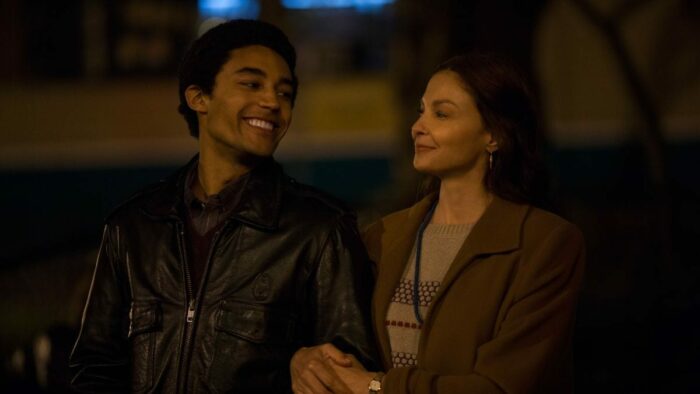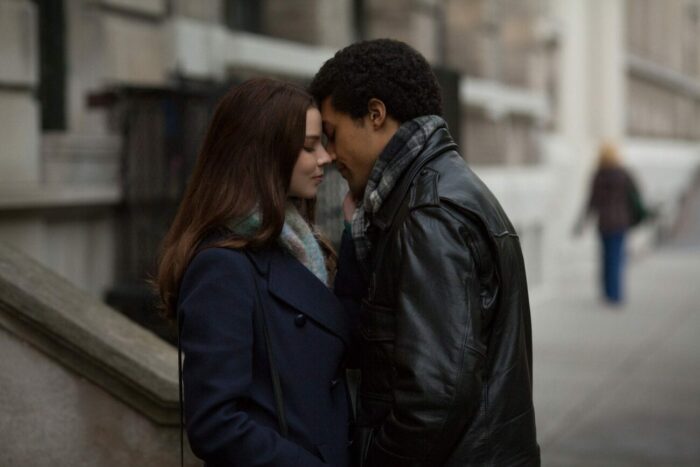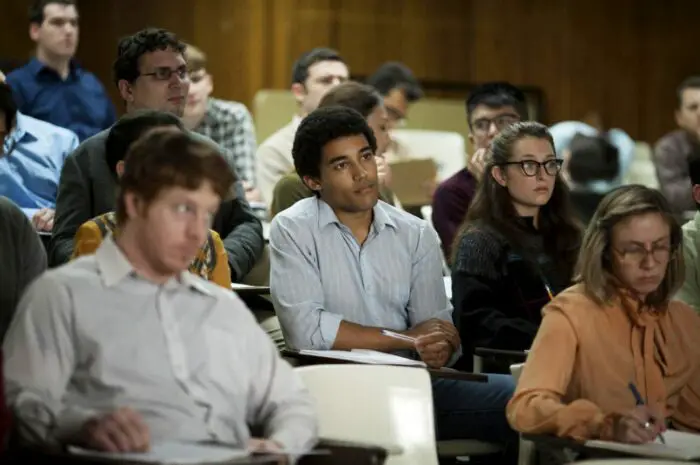Every influential man or woman had a formative period of their life, where their impressionable knowledge coalesced into cemented principles that would guide them going forward. The beloved and popular 44th President of the United States, Barack Obama, is no different. The Netflix film and VOD entry Barry from director and do-it-all talent Vikram Gandhi, not to be confused with the Bill Hader TV series that came after it, muses on the internal and external catalysts that shaped the then-20-year-old piece of unformed clay into the future leader of the free world.
The film chronicles 1981 and 1982, Obama’s first year in New York City as a transferring junior and political science major attending Columbia University. Living just off the Morningside Heights campus on 109th Street, a stone’s throw from Harlem, Barry, as he prefers to be called (played by then-newcomer Devon Terrell—currently of TV’s Cursed), is greeted by a cold and indifferent first impression of New York. Unable to contact his roommate Will (Boyhood lead Ellar Coltrane), Barry spends his first night sleeping in the alley before crashing with the hop-headed Saleem (The Walking Dead‘s Avi Nash).
The Barry we see navigating student life in the big city sticks out like a sore thumb in many ways. He is a bit of an expat is his own country with an unseen Kenyan father and a college preparatory youth spent in Hawaii and Indonesia with his white mother Ann Dunham (Ashley Judd, invisibly playing ten years younger than her age). Barry is clearly a standout student, smarter than the room, showing up his white conservative peers and coyly winning classroom debates with push-backs of philosophical thinking and racial temperance in the hey-day of Ronald Reagan. His refined intellect catches the smitten eye of Charlotte Baughman (Anya Taylor-Joy of The Witch and currently seen in the red-hot The Queen’s Gambit), a progressive classmate with silver spoon parents (Linus Roache and Jenna Elfman).

Barry operates as an individual somewhere between societal norms, racial divisions, and superseded associations. He’s a man without a single home or a true calling as of yet. Through his personal experiences, trials, and tribulations in New York, he will slowly discover one portion of the definition of his overall identity: American.
Outside of class, Barry’s mixed racial background makes him an anomaly. Even with an ever-present square of smokes, he’s a little too strait-laced to shoot hoops on the rough basketball courts of the local projects, but does befriend a local college student named P.J. (Straight Outta Compton star Jason Mitchell) who tries to show him around. Though he longs to embrace and discover black heritage in and around Harlem, he comes off as “too white” being an educated and cultured guy, an image made worse when he’s walking around with Charlotte on his arm. Comparatively, half-black is still black enough to receive bigoted prejudice and discrimination from everyone else though.

Deeper and more complicated than verbal barbs are the unspoken judgments made that only body language can display. Filters might be in place to hold back the words, but the gazes, stares, and indifference Barry encounters and reads speak plenty. Wrongful assumptions are made of him across the board as either a black man in a white man’s world, an educated and well-off black man in poor black world, or a mixed-raced individual who cannot fully identify or associate with either half fully. There are times he is invisible in Barry and others where he cannot escape visibility.
One of the telling flaws Barry presents is an Obama that doesn’t readily share his personal feelings to close friends. He can spout stances and opinions on curricular rhetoric all day (to no surprise), but he internalizes those perceptions from the injustices, perceptions, and his fractured history with his father to Charlotte, P.J., and even his own mother. He would learn to open up to those who care with time.

What makes Barry tick is examining the internalization of perception emanating from the title character. How the young Obama deals with love, estranged family ties, his educational aspirations, and the roadblocks put in front of him as a black and mixed race man in society are behaviors put on display by Gandhi and debuting screenwriter Adam Mansbach. These bits of New York City, lensed beautifully by Adam Newport-Berra (Creative Control), exposes how society views him and it rattles him plenty.
That effect was not lost by the actor playing the real-life figure. Devon Terrell, in his first film role, balances the reflective and introverted conflict going on between cigarette drags with the smiling mannerisms and educated speech cadences of a man who can gain attention if necessary. Unflashy and never acting with imitation or caricature, this was a superb and revealing film debut for the young actor. Five years later, the guy deserves more roles than merely TV ensemble work.
Before leaving office in 2016, Barack Obama inspired two miniature biopics. The exceptional Southside with You in 2015 showed a confident and motivated Obama, chronicling the catalyst of his romantic life with his future wife. The younger, more impressionable, and equally reflective Barack seen in Barry makes for a stellar companion piece and first half of a double feature with Richard Tanne’s work. Both films take small episodes and compose them into thoughtful and moving poetic samples with wealths to appreciate. Neither film shies away from humanizing character flaws and, best of all, both films operate with respectful and nonpolitical timbres. Biased and showy hero worship is rightfully absent.



